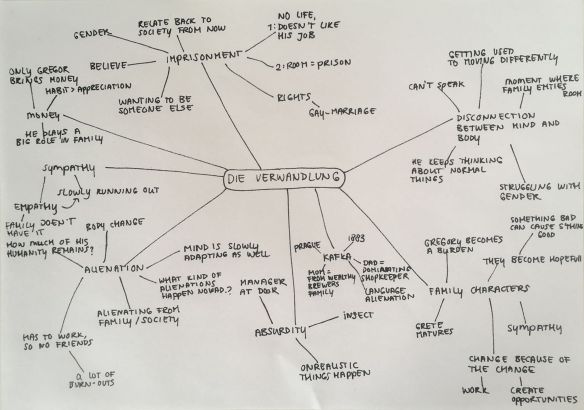
Absurdity
Gregor’s metamorphosis takes on a supernatural significance. Also notable is the fact that the story never explains Gregor’s transformation. It never implies, for instance, that Gregor’s change is the result of any particular cause, such as punishment for some misbehavior. On the contrary, by all evidence Gregor has been a good son and brother, taking a job he dislikes so that he can provide for them and planning to pay for his sister to study music at the conservatory. There is no indication that Gregor deserves his fate.
The responses of the various characters add to this sense of absurdity, specifically because they seem almost as absurd as Gregor’s transformation itself. Even Gregor panics only at the thought of getting in trouble at work, not at the realization that he is physically altered, and he makes no efforts to determine what caused the change or how to fix it. He worries instead about commonplace problems, like what makes him feel physically comfortable.
Alienation & imprisonment
Perhaps the greatest consequence of Gregor’s metamorphosis is the psychological distance it creates between Gregor and those around him. Gregor’s change makes him literally and emotionally separate from his family members—indeed, from humanity in general—and he even refers to it as his “imprisonment.”
First he is trapped in a meaningless job without any other fun activities. Gregor is thought of as an insect by himself and by others, so he becomes one. After his transformation he stays almost exclusively in his room with his door closed and has almost no contact with other people. Furthermore, he is unable to speak, and consequently he has no way of communicating with other people.Through the window, he watched his life wither and fade, he watched people move on with their lives, especially in the darkness of his room, the light emitted through the window was his only connection with humanity until he finally transformed to a total insect.
If you interpret the story as relating to dehumanization, though, you certainly could perceive Gregor as a victim of dehumanization. He is turned into a bug, of course. He is alienated from and mistreated by his family. He is rejected by his employer. He is isolated and made to stay in his room.
Following his metamorphosis, Gregor is freed of his financial obligation to his family but is burdened by guilt because of this freedom. Everybody in the family is undergoing a metamorphosis. Many critics who approach the story in this way believe the primary emphasis of The Metamorphosis is not upon Gregor, but on his family, as they abandon their dependence on him and learn to be self-sufficient.
Disconnection between body and mind
Gregor’s transformation completely alters his outward appearance, but it leaves his mind unchanged, creating a discord, or lack of harmony, between his mind and body. When he first gets out of his bed after waking, for instance, he tries to stand upright, even though his body is not suited to being upright. He continues to think with a human mind, but because his body is no longer human, he is unable at first to reconcile these two parts of himself.
As Gregor becomes accustomed to his new body, his mind begins to change in accordance with his physical needs and desires. Yet he’s never able to fully bring his mind and body into harmony. Gregor gradually behaves more and more like an insect, not only craving different foods than he did when he was human, but also beginning to prefer tight, dark spaces, like the area under his sofa, and enjoying crawling on the walls and ceiling. (Through these details, the story suggests that our physical lives shape and direct our mental lives, not the other way around.) But Gregor’s humanity never disappears entirely, and he feels conflicted as a result.
The limits of sympathy & empathy
Before Gregor’s transformation the family already had a lack of empathy for Gregor. He was doing a job he didn’t like, just to take care of the family. After Gregor’s metamorphosis, his family members struggle with feelings of both sympathy and revulsion toward him. Grete and the mother in particular feel a great deal of sympathy for Gregor after his change, apparently because they suspect some aspect of his humanity remains despite his appearance. This sympathy leads Grete initially to take on the role of Gregor’s caretaker.
Gregor is a dedicated man who has a lot of virtue than the people around him and still he is the one who exist in a certain level of separation. He is a man and takes care of his family in a setting where no one else is giving it back to him, they only take advantage of him and his good efforts. When he is the one that needs some care-taking, he is looked upon as something of a vermin, and his family ‘murders’ him through neglect.
Gregor’s presence is never forgotten in the house, causing the family members to feel constantly uncomfortable and leading them to speak to each other mostly in whispers. Moreover, the fact that Gregor cannot communicate his thoughts and feelings to them leaves them without any connection to his human side, and consequently, they come to see him more and more as an actual insect. All these factors combined steadily work against their sympathy, and the family reaches a point where Gregor’s presence is too much to bear. Even the most caring of them find that their sympathy has a limit.
The book touches off our fears that virtue has no reward, and at the end of the day no amount of virtue will be enough to warrant love from those who are less virtuous.
At what point is Gregor not Gregor anymore? At what point can the family set their (low level of) empathy aside and let him go?
Sources:
